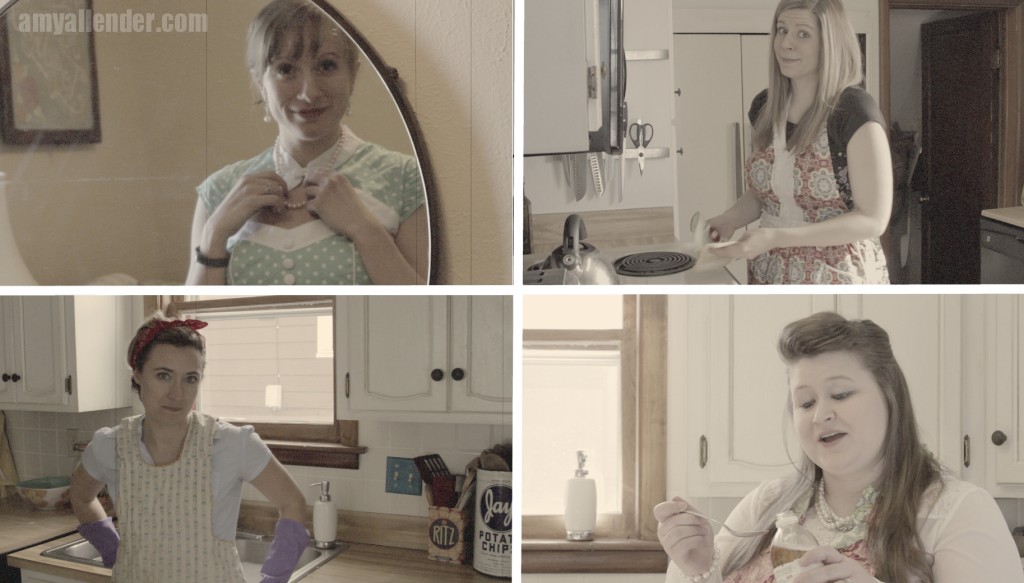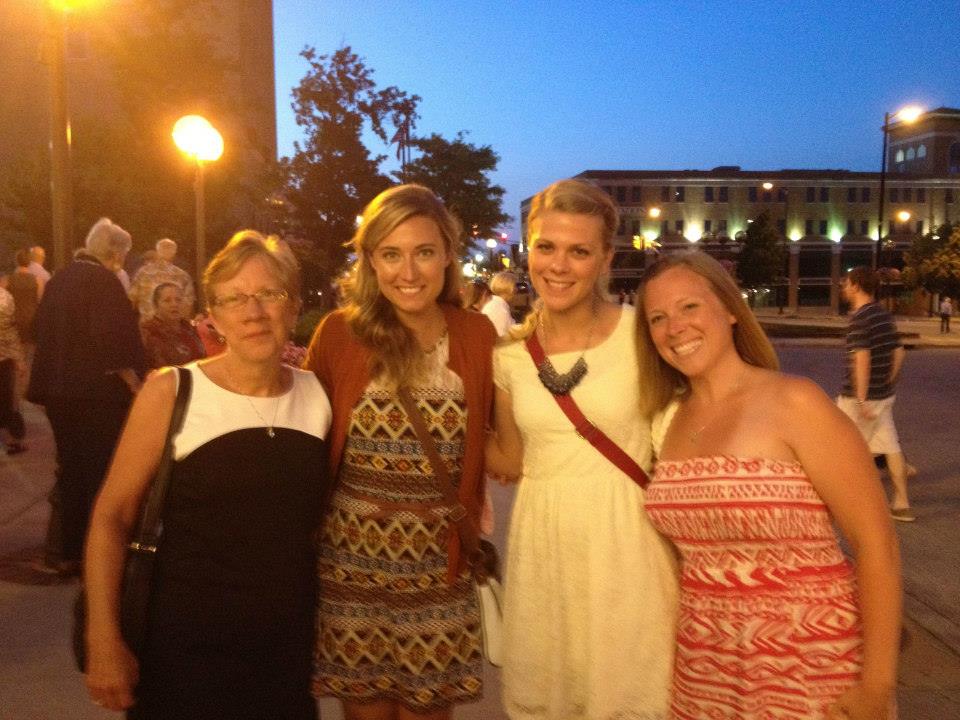by Amy | Jul 9, 2014 | Blog, Devotional, The Art of Faith
Last week I wrote about how we, as Christians are called to be different. Originally I was going to combine that premise to what I’m writing about now–leadership.
 Image Via
Image Via
But as I started, it all got too long and fuzzy. So I decided to sit on this one for another week and split the two up. Today, I’ll continue the discussion, this time focusing on leadership.
Leadership is a beautiful thing. It’s something we all crave in one way or another. We crave to have control and be the leaders in our own lives, over others, to bask in the glow of recognition and importance. Or–we crave to be lead. We want someone to focus us, guide us, give us answers and lead us.
You see, naturally I’m drawn to be a leader. That’s why the notion of marriage was so hard for me to grasp for so long. I hated the idea of being led. My parents could probably tell you that that leadership quality made me a great student and a terrible child to rear. I didn’t even like being led by my parents–I wanted to do and do my way. Now, many years {and lots of grace} later I’ve learned that leadership isn’t just about control, or stubbornness, or doing things your way and no other way. I’ve learned that a great leader can also be led, and a strong individual needs to understand the beauty and importance of submission. {See how Jesus submits to the Father and the centurion–a leader himself–knew the importance of rank, and Paul describes the family order…}
I’ve thought about leaders lately. It might be the NPR, Derek’s job, my work with the youth group, or seeing brilliant teens work leading a 5-Day club in my yard. Who knows. So, I started to look at the Bible. At leaders in the Bible–particularly Jesus, but a few others as well. I studied them and paid attention to the things they had in common. And I discovered something. Leadership is less about control and glory and more about servant-hood.
It seems like an oxymoron. A servant leader.
But that is exactly what all the best leaders were. Servants.
They were most effective and at their best when they set their eyes on how to best serve, know and love people they were leading, while fulfilling their duties. We see Jesus {our prime example} do this over and over again. He knows the people He is leading. He knows their laws and their boring stuff. But He also knows them. And He chooses to love them. Like the famous “woman at the well.” Or the “wee little man” Zachaeous. Jesus knew Him, pursued him out of the tree and dined with Him.
Jesus clearly tells us to be great, to lead…we must first know how to serve. Mark 9:35 says:
…Anyone who wants to be first must be the very last, and the servant of all.
Another thing I found about servant leadership is that great Biblical leaders, even Jesus himself are real. They are down to earth and transparent with those they lead. Now, Jesus had no faults. So He couldn’t be transparent with those. But He set a clear example of submission for us to follow. He showed us what it meant to commune with the Father and be submissive to Him. {John 6:38-40}.
As we lead, we should never stop considering the lives and hearts of those we are leading. We should consider if there is a way to make their load lighter, their work more enjoyable, or a way the leader can better serve.
A leader should be wary of becoming prideful, remembering the needs of others–again becoming the servant. See Luke 22:25-27. Instead of loving control and importance, a great leader loves seeing his people move in the right direction.Instead of relying on his own strength and insight, we as leaders should constantly look to Christ and be humble before Him.
A great leader is always obedient to God. Knowing that God places those in authority. And He prizes obedience over great deeds and fame. It’s hard, but prayerfully attempt to be content if authority is taken from you and placed in someone else’s hands. A spirit of control is unbecoming on every one. 1 Samuel 15:22
What is more pleasing to the Lord:
your burnt offerings and sacrifices
or your obedience to his voice?
Listen! Obedience is better than sacrifice,
and submission is better than offering the fat of rams.
Leaders realize the value in teamwork. In sharing the load of a big vision with others God raises up. Think about the calling of the disciples, how they spread the Gospel after Christ’s resurrection and grew in number and force. {Mark 1:16-18;Acts 6:1-7; Acts 18:24-28}
I know there are lots of other good leadership qualities. There are more that are even Biblical qualities. But these are some that helped me those many, many months ago. As I said last week–we are called to be different. I believe we are called to lead. And anyone who can serve, can lead. In our lives, in whatever capacity we can, we are to point–to lead–to Christ and His lovely truth. I hope you’ll dig in to some of these verses. Heck, find some more to add to the list–then start putting them into practice. Step up as a leader in any fashion your life will allow. It might not be in the fanciest, most glamorous way…but we all have a platform we can use to lead–even a couple–to be different. Different isn’t lame, remember? It’s awesome. It’s eternal.
by Amy | Jul 1, 2014 | Blog, Devotional, The Art of Faith
It’s almost cliche to say that as Christians we are called to be different. It’s something I grew up hearing, it’s something I’ve said. And it’s true.
It’s a salve we put on wounds and aches when our peers poke fun at us for not drinking at the party, or because we chose to abstain, or because we don’t cuss, or we choose to go to church instead of sleeping in. The words of a judgmental world can hurt. And when they do, we can always call on those friendly Sunday School words to comfort us–“We are to be in the world, not of the world.” {Referencing Romans 12:2} We are called to be different.
 Image via
Image via
Somehow, sometimes, though I feel like that idea can translate to say: We are called to be lame.
Lame, because being “different” in a Christian sense can often mean not doing things the world sees as awesome. Today, I’d like to propose we take a more positive view. I’ve come to find that a big part of being different, a big part of “not conforming to the pattern of this world” means embracing our different and leading. Timothy 4:12 says we are to…“set an example for the believers in speech, in conduct, in love, in faith and in purity.”
We are set apart for a purpose. Not just to be boring people that are easy targets. Not just to prove our allegiance to Christ. We are set apart because the world can be a dark and confusing place. But God loves the people here in the dark and confusion. So once we find the light in all this mess, in this worldly pattern of sin and slime…it’s our job to lead. First we have to recognize the pattern of the world, then find the joy in breaking the pattern and lead others to that same joy.
 image via
image via
God gives us a promise for when we do:
Then you will be able to test and approve what God’s will is—his good, pleasing and perfect will.
And who doesn’t want that? Mastering the Art of Living means understanding God’s will. That’s the real Art of Living, right there. And He promises that when we renew our minds instead of conforming to the world…we will be able to understand His will. A will that might not make sense otherwise.
So back to leading. I know this verse doesn’t explicitly tell us to lead others along the road to renewal. But others do. {Matt 29:19-20; 1 Peter 3:15; Luke 7:22-23} If you have felt that the call to be different is a call to be boring or lame, I challenge to today to change your mind. Accept the role of different, allow yourself to become a leader–an example, an inspiration, a guiding light–to others lost in the pattern of the world. You can do it. You were called to it.
by Amy | May 14, 2014 | Blog, Devotional, The Art of Faith

Sometimes sermons haunt me. No matter what I do, I just can’t stop thinking about what was said in church on Sunday. Sometimes it’s a thought provoking–new knowledge of a well known passage. Other times it’s convicting. Still other times it can be something else all together that causes what the pastor said to stick with me.
Once upon a time I went to a church with a very elderly, very old school, and sometimes very offensive pastor. {I think some of you may know of whom I speak.} Now, there are a few instances that have held fast in my mind. But one in particular keeps cropping up these days.
As many of you know, I’ve been injured. That means I’ve basically had to quit teaching classes at the gym…and it also means I can’t do the heavy lifting involved with my other favorite pass time: house projects. All this has left me wondering what comes next. It seems like another fork in the road. I crave a productive life. In the wake of the choices that lay ahead of me for my future {possible without those intense activities}, I’ve been thinking a lot about what I should do. What has happened to my body is no one’s fault but my own. I worked too much, I lifted too many things, I ran and jumped and challenged myself all the time. Was I wrong to do that?
That’s where the old pastor comes in. Something he said in a Sunday sermon has haunted me since I was a newly married girl, back in 2009. It made me so angry at the time I wanted to get up and walk out of church.
Now, older, wiser, {slightly} less hot headed, I’ve been considering his words again. I long to be a Godly wife. A woman who does good, and is someone God–as well as my husband–can look upon with pride. So I have thought back to that fateful Sunday morning to see if what he had said only offended me because of my young, self-centered pride. I don’t think so…but you be the judge.
What he said went something like this:
A wife should not feel compelled to busy herself outside the home. Sure, she might think working is a good idea. You might even think it could bring in a little extra money. But let me break it down like this. If she is going to be employed outside the home, she’ll need her own car, she’ll need new clothes, fancy shoes, money for gas,…the list goes on. Throw in the cost of child care while she’s away and all the money spent on meals out because she won’t be able to prepare dinner…and have you really gained anything at all? I’d even bet that a working wife costs the family money in the end.
Really. He said it. I couldn’t make logic like that up.

As his words have gnawed at me, I’ve gone to a better authority on women and wives and what we should {and shouldn’t} be doing…God. After all, he created them. I’ve decided to stop looking at the world, even pastors, for advice on what I should be–or if I have ruined myself, or if I should cut out my driven heart with a knife borrowed from Snow White’s step mom. Instead, I’ll be looking into the Word. The Bible has all kinds of wonderful advice on how to be a great wife, how God cares for his women, and why women are poised to have a unique place in Christ’s great commission. One of the places I’ve looked lately has been Proverbs 31, at the woman the Bible refers to as a “noble wife.”
The woman in Proverbs 31 is so productive, so respectable, so lovely. I just can’t help but admire her. I’m actively trying to define what she does right and apply it to my own life.
If you aren’t familiar with what I’m talking about…read the whole chapter here. If you just need a refresher, let me enlighten you. Her husband trusts her with all that they have, he knows she is smart…not only book smart, but in practical ways too. She can make wise investments, she is savvy. She uses her skills to make things for her home and family. She likes creating things to much that she uses her smarts and her talents to earn extra money for their family. She works hard and she turns a profit. She is so thrifty and lucrative {not only with household funds, but also the money she has earned herself} that she knows her family is securely provided for–in turn she gives generously and is compassionate to those with less.
I love this verse:
She sets about her work vigorously;
her arms are strong for her tasks.
She’s strong and not intimidated by manual labor. I love that.
She works vigorously.
This is not a woman who is confined that old pastor’s ideal of wives. Her husband doesn’t restrict her. He doesn’t insist that her endeavors are silly or unimportant, or costly to the household. Quite the opposite: Her husband trusts her to make big choices, to work hard, to accept physical challenges. She works, both in the home and in the marketplace. Her mate does not stifle her by insisting that the things she enjoys could never be part of their life. He doesn’t tell her that her skills should be put aside because he doesn’t want to waste his money on nice clothes or a cart to haul her wares. Nope. That isn’t in this chapter at all. Her husband looks at all she does and tells her that she surpasses all others. He likes his hard working, creative, fit, savvy bride.
I’m not saying any of this to say that working outside the home is what every wife should do. Or that it’s the only way. Or to demean stay-at-home wives and mothers. No matter what you do, and where you do it, God calls us ladies to work hard and have some fruit {whether linen to sell in the market place like Miss Prov31, or wonderful-God-fearing children} to show for it.
Will I ever be able to go back to working as vigorously as I once did? Only time will tell on that front. But I am at peace, resting assured that my drive and ambition are not out of line with what God would want from me. I think God likes girls who get stuff done. Now I’ll try to be patient {and low impact} as I wait for what He will challenge me with next.
xo
Amy
by Amy | Apr 15, 2014 | Blog, Devotional, The Art of Faith
I know you remember Lindsay from Friday’s Art of Living post. If you missed it, you should read that first, here. In addition to being a wonderful woman of God with a heart built for service and an attitude that waits upon the Lord…she is also a very gifted writer. {Which may be due, in part, to that Baylor English degree.}

After chatting with her on the phone to record her story for you, she shared a journal entry that she wrote after looking back on her long journey in Shreveport…through the broken-hearted moments of struggling to find contentment in the Lord and the trials of finding her calling. She kindly allowed me to share it with you here. I think you’ll agree that these words are beautifully crafted and soothing to a weary soul. Enjoy! {And a big thanks to Lindsay for opening her heart, soul and talents to us. You really are the best.}
When Pharaoh let the people go, God did not lead them on the road through the Philistine country, though that was shorter. For God said, “If they face war, they might change their minds and return to Egypt.” So God led the people around by the desert road toward the Red Sea. The Israelites went up out of Egypt ready for battle. Exodus 13:17-18 NIV
This verse was written for me today. There are an infinite number of people and reasons God had in mind when He penned it, I have no doubt, but today, it reached out and grabbed my hand to guide me into deeper intimacy with my Lord. To remind me, in a season of wilderness, that He firmly has my best in mind, and from His compassion and guardianship, He leads! Though it was shorter – if ever there was a balm for my aching heart. There was a quicker way for the Israelites to get to their destination. God knew it, but because He knew them well, as well as He knew the map, He didn’t choose it. They needed the sea. God didn’t need the sea; I have no doubt He could have conquered the battle on the short road, but the Israelites hearts weren’t ready for that battle. They needed the long road. They needed the sea.
The rest of verse 18 says, “The Israelites went up out of Egypt ready for battle.” I have no way of knowing, but for a minute, I want to pretend they knew about the shorter road and the possibility of war. And they were ready – at least they thought they were.
I graduated college armed for battle in my own way. I was ready to fight the injustices of this world, ready to make a difference for the Kingdom, ready for the short (yet hard) road through law school and to a career of significance. Then God chose the long road through Shreveport.
And I have not understood.
And I have identified the many different routes I could have taken.
And I have pointed to the routes others are on.
And I have complained.
And I have cried.
And I have waited, for answers and explanations and change.
But have I waited for deliverance?
Maybe the answers are in the deliverance. Not from Shreveport – but through Shreveport – from the bondage of perfectionism and significance and self-worth. From the chariots and skilled riders that have chased me for years, refusing to fully release me to worship. Telling me I can go worship as long as I leave a part of my sacrifice behind (Ex. 10:24-25).
“But God, there is a quicker route. Let me carry my own armor and show you. But God…”
Oh Israel, Oh my children, Oh my Lindsay…I can almost hear His voice of compassion audibly. I have a better plan.
They may have left armed for battle, but soon their boldness (Ex 14:8) turned to fear (Ex 14:10) with one pursuit. I definitely wonder what an all-out war would have caused. They needed the long road. They needed the ocean. They didn’t need to see their armor or skill outlast that of their enemy. They didn’t need another medal or accolade. They needed to see an ALL POWERFUL GOD fully destroy their pursuer. They needed to walk a long road, through a parted Red Sea, where not one of their pursuers could follow. It may have been longer, but it was better. And they worshiped. My feet may hurt from the journey and my eyes may be tired, but if the long road is what I need, I am thankful. There were some easier roads, but the long road leads to the greatest victory. And I will worship.
And when the Israelites saw the mighty hand of the Lord displayed against the Egyptians, the people feared the Lord and put their trust in him and in Moses his servant. Exodus 14:31
by Amy | Mar 6, 2014 | Blog, The Art of Faith

{image via OpenBible.org…with the biggest text indicating the most popular lenten fasts.}
I’m not Catholic and I didn’t grow up Catholic. It wasn’t until I was in high school that I realized what Mardi Gras actually celebrated: One last day of fun and frolic before lent begins.
I always liked celebrating lent. I was shocked when I realized all churches didn’t have an Ash Wednesday service. I remember talking to Derek one year, early in our relationship about lent. I asked him if he was planning to give anything up. “No. We don’t really do that.”
Again. Shocked.
So here I am. A little older, maybe wiser. At least less naive about lenten practices. But I still like lent. I’m not saying I always make some elaborate “Lenten Promise,” or give up meat on Fridays…and in no way am I saying that fasting something over lent makes you in any way superior. I just like having a season that causes us to reflect on Christ’s fast/temptation. I like a season that disciplines some of our own “worldly” tendencies and quiets our hearts in preparation to celebrate the gift of salvation. I’m old school…so sue me.
I was about an inch away from not giving anything up this year. Then Tuesday night, literally at the eleventh hour, I decided to begin a fast from something that has been eroding my time, productivity, and spirituality: TV during the day.
My third grad teacher, Mrs. Carlson, could tell you that I’m the type of person who holds her pencils too tight. She was always on me, telling me to loosen my grip or else I’d get cramped hands. Pretty much, that’s an analogy for me in many areas of my life. I’m a tight holder. To lots of things. God, however, wants us to be open handed on the earth. He tells us to be “in the world, not of the world.” He asks us to have a loose grip on the world so we can have a tight grip on Him.
Yeah. I struggle with that. I have to make loads of tiny, conscience decisions to be open handed with the gifts He’s given me, and to let go of worldly things that distract me from Him.
And one of the biggest distractions is TV during the day.
I love TV. Love it. So much, I let NetFlix play nearly constantly through the day. When a series ends, I find a new one. I don’t necessarily watch closely. But I like the noise. And I’d rather hear a story line than music in the background. In my heart of hearts I’ve wanted to give up turning the tube on during my “working” hours. Then I’d make some kind of loop hole excuse as to why I didn’t really need to.
I’ll only have it on during my morning coffee.
Only if I’m doing the “mindless” parts of projects.
Only during lunch.
Soon, my web of excuses was more porous than a sheet of cheese cloth.
I thought about lent. A perfect time to make a fasting commitment and stick to it. Then I would think how much I liked TV and how if I didn’t give anything up, I wouldn’t be out anything…because no one expects me to give something up anyway. Right? But a realization sunk in. Isn’t anything we place a higher priority than our relationship with the Lord an idol?
Yep.
It makes me feel a little sick to my stomach that I’d avoid giving something as trivial as TV up in order to spend that time in communion with Christ. Really. I’d rather be watching reruns of The Office than cultivating a deeper relationship with the Creator of the whole universe? Scary.
TV isn’t evil in itself. There is something wrong when it {or anything} becomes more important/enjoyable/pertinent to our day than focusing on Christ. There is something wrong when a worldly commodity places our eyes for the Kingdom and the glory of God in a shadow.
Yikes. TV came up on me quietly, stealthily. Slowly it tempted me away from coffee and Bible…to coffee and NetFlix. It took me away from quiet projects prayerfully completed…to projects finished to a soundtrack of reruns. Gross.
So it’s lent and I gave it up. My heart needs to be quieted. My heart needed to face its convictions. Even though my hands hurt as I loosen their grip on my TV addiction, {and I sound super lame talking about my “first world” problems of too much television…} I consciously want to make the choice to put God back in His rightful place: As king over everything in my world.
Even if you aren’t fasting from something this season, I hope you’ll consciously take the time and effort to examine your relationship with Christ. Take inventory of your heart, clear out the gunk blocking a stellar, intimate, crazy-love relationship with God. You’ll be refreshed and totally ready to celebrate another Easter with the King.
Amy
by Amy | Mar 4, 2014 | Blog, The Art of Faith, The Art of the Moment

Take a sneak peek at one of my latest projects. Cute, right?
It’s a short promo video for an upcoming women’s retreat that my church {First Baptist Minot} is hosting in April. The theme that the committee is working with is “One Wise Woman.” An over arching idea for the weekend is the wisdom in learning from women of the past. A short brain storming session later and we had a basic story board for a promotional video that would highlight wisdom from “women of the past.”
I’ve got to lend props to a few of my personal Facebook friends for replying to a call out for mom-isms. My personal favorite was, “Good medicine doesn’t always taste good.” We used those lines, along with others I found on the P&G “Mom Always Said…” Pintrest board. The idea is that we filmed a montage of wise, witty, womanly sayings.
And lucky for me…FBC is stocked with plenty of adorable 20-somethings that were willing to take part. {I’d say three of the four are pretty keen looking. That one in the lower left is kind of goofy…} I’m excited to show you all the finished product. But you’ll just have to wait.
In the mean time, tell me…What’s the best advice you ever got from an older, wiser woman?
PS–If you are in the PraCan area, you should totally come to the retreat. Details here. The guest speaker is Lysa Terkeurst, president of Proverbs 31 Ministries!
by Amy | Mar 4, 2014 | Blog, Devotional, The Art of Faith

Today I was shopping downtown at one of my favorite book stores. When I came out I went to my car and tried to open the door. Maybe I shouldn’t tell you this, but I will anyway…I don’t usually lock my car doors. Especially not when I’m in downtown PraCan. My car isn’t that nice, and there sure as heck isn’t anything inside worth taking.
So, you can imagine that I was a bit confused to find the door locked.
That’s when it hit me. I looked inside the window. A travel mug. A stellar interior. This. Is. Not. My. Car.
Awkward.
Then there was that moment when I looked over my shoulder, sure the true owner had seen me and would be asking questions. Luckily there was no one around. So I looked across the street to find my own Chevy Equinox, got inside…and snapped a photo of the mistaken identity to show you later.
It got me thinking about mistaken identity. From the outside lots of things can look the same. A silver Equinox parked on the side of the street can be mistaken for another. I can think that car is my car. {And I did.} It’s only when you look through the window to see the interior that you recognize you’ve made a mistake. It could happen with any number of things. For instance, a ripe watermelon looks pretty much the same as one that’s gone bad. When you chop into it, you’ll find juicy, solid fruit…or a pile of weird, watery mush.
People can be like this too. From the outside you draw conclusions. But the Bible teaches us that God cares most about what is inside. He teaches us to beware of outward appearances and instead examine the heart. To look through the window to examine the interior, before we commit to getting inside the wrong vehicle. {Matthew 15:1-20; Proverbs 21:2; Jeremiah 17:10; Luke 16:15 the list goes on and on…}
From the outside two people can both look caring, compassionate, and Christ-loving. Their insides, however can be very, very different. One can be of pure intentions, while the other can be motivated by vanity, selfishness, or the desire to seem holy. {Gee…sounds like some Pharisees I heard about once.}
Recently I taught a lesson on purity inside our social media. I pulled Facebook statuses from lots of my friends and had our youth group teens draw conclusions about them. The kicker was that I pulled two from the same person. One that advocated going to the bars for cheap drinks and a night of wasted fun. One that contained a call to prayer. That’s weird. That’s hypocrisy. That’s how mistaken identity can occur.
What identity are you portraying? Is it a pure image of who you really are? Are your intentions pure? Or are you trying to trap the outside world into mistaking your identity?
Take time to pray that God would guide your assessment of others. That He would teach you to be an examiner of hearts, now outward appearances. Pray that He would purify your intentions as well…so everyone can see just how wonderful you are.
Amy
by Amy | Feb 27, 2014 | Blog, Devotional, The Art of Faith
Sometimes, when I don’t know how to start, I just begin with something obvious. It’s a good jumping off point. Today I’ll start with this thought.
We all have parents.

Whether they excelled at being a mom and dad, I can’t tell you. But it doesn’t change the fact that we all come from somewhere. A question I’ve been examining lately is what it means to honor your parents once you are all grown up {and maybe even a parent yourself.}

As many of you know, the idea of honoring your mom and dad comes from the Bible. We see it in the 10 Commandments. This notion ranks in the top ten of rules most important to God. And not only is it in the top ten, it makes the top five. Not only the top five, but it’s the first of the commandments to be accompanied by a promise if it’s kept. Exodus 20:12 says:
Honor your father and your mother, so that you may live long in the land the Lord your God is giving you.
So that you may live long…this commandment comes with a promise of longevity. A bit later, it comes with a promise of death if it’s broken. The very next chapter in Exodus {21:17} tells us:
Anyone who curses their father and mother is to be put to death.
Obviously, God cherishes parents. I won’t stay long on the topic of why longevity, but I think it’s worth touching. If children are raised according to God’s household plan, they grow up respecting their parents {honoring them, obeying them}. This leads to young adults who understand the beauty and importance of submission, not only to their parents, but to authority and ultimately, to God. People who practice self discipline and respect those in authority generally live safer, healthier, un-jailed, longer, lives. I’m not saying there aren’t any unusual circumstances. We live in a broken world, a world where the household isn’t always carried out how God intended, in a world where authority isn’t always 100% sound. But this was the plan. And children who grow up learning the value of self control, tend to grow up to avoid silly, physical risks.
It’s easy to look at the command and think you’ve done your part because you are all grown up now and when you were a child you {kind of} always did what they asked of you. But it’s not that easy. This isn’t only a commandment to children. There is no age limit on honoring your parents. So how do we carry this out when we live states away, own our own home, or are just off at college?
Luckily, the Bible gives a clear picture of what adult parent-honoring looks like.
First of all, the Hebrew translation of the word “honor” from Exodus 20 has a few layers of meaning. One is to obey/respect. Another is to “make honorable.” This means when we speak of our parents as adults it should put them in a good light. Even thought it’s very easy to vent frustration out to siblings or friends, we are to speak favorably of them. Further, we should put them in good light in front of others. Let’s look to Joseph for an example of this.
You can read the whole story here. For our purposes, let’s skip ahead. Joe was sold into Egypt and had since been promoted to Pharaoh’s go-to-guy. When he and his father were reunited he:
…brought his father Jacob in and presented him before Pharaoh. –Genesis 47:7
He took his dad to the ruler of the world’s mega power and presented him as a man the Pharaoh should know and respect.
Secondly, as adults we should continue to show our parents respect by addressing them respectfully and doing what they ask of us, even though we don’t “have to” any more. For this one let’s look at Jesus, right before he turns water to wine. See the whole story here.
Okay. Here is my major paraphrase. Really you should read the Biblical version. But this is the general idea. Jesus and His disciples are at a wedding and the wine runs out. Jesus’ mom is there and asks Him to perform a miracle to make more. John 2:4-5 says:
‘Dear woman, why do you involve me?’ Jesus replied. ‘My time has not yet come.’
His mother said to the servants, ‘Do whatever he tells you.’
A couple things here.
- 1. “Dear woman” is a term of respect. He’s not looking down on her or belittling her, instead He is demonstrating respect for His mom.
- He does it! He doesn’t need to. As He makes very clear: He takes His orders from His Father in heaven. But Mary is confident that He can make the miracle happen. And He does.
The last big Biblical example of honoring your mom and dad as an adult comes, again from Jesus. {But it’s found all over Scripture.}

The third way I see Scripture showing us how to honor our father and mother in adulthood is by caring for their needs. Look at Mark 7. Here we have the Pharisees giving Jesus and His disciples grief because they ate without going through the ceremonious rigamarole that was the standard for “hand washing.” It was an ordeal that had little to do with cleanliness and everything to do with vanity and outward appearances. In Mark 7:8-13 Jesus turns to them and says:
And he continued, “You have a fine way of setting aside the commands of God in order to observe your own traditions! For Moses said, ‘Honor your father and mother,’ and, ‘Anyone who curses their father or mother is to be put to death.’
But you say that if anyone declares that what might have been used to help their father or mother is Corban (that is, devoted to God)— then you no longer let them do anything for their father or mother. Thus you nullify the word of God by your tradition that you have handed down. And you do many things like that.
Do you know what Corban means? I didn’t either, until I started really studying this. It’s a buzzword for another one of the Pharisees’ traditions. Corban was an “out.” Let’s say you had elderly, poverty-stricken parents. They are sick and cannot live on their own. They don’t have money or the ability to care for themselves. In Jesus’ day, you could just say, “Corban!” That would end the discussion. It implies that all you have you are giving to the temple. Any help you could have given them, you plan to give away.
Now, whether people actually did give it to the temple was up for debate. Mostly it seems they liked to throw around the word corban to make themselves seem high and mighty. Like perfect givers. They didn’t want to help their parents. They wanted to be able to give big showy gifts to the temple…so they’d look good in front of their peers. It was done in vanity, and we were created by a God who examines the heart. The Bible shows us that faithful tithing is a healthy habit. But we are commanded to honor our parents. That trumps any tradition or vain practice.
He could have used a different instance to demonstrate the Pharisees use of tradition to buck God’s law, but He chose this one. Which makes me think, taking care of parents physically and lovingly is near and dear to our Lord’s heart.
Okay, one more look at this. Then I’m done. Promise. John 19:26 records an intimate moment shortly before Jesus was crucified. He knows He will be leaving the Earth, He knows He doesn’t have much time. So one of Jesus’ final acts is to make sure He is not calling “Corban.” He ensures that His mother is cared for.
When Jesus saw His mother there, and the disciple whom He loved standing nearby, He said to His mother, “Dear woman, here is your son,” and to the disciple, “Here is your mother.” From that time on the disciple took her into his home.
I’d love to hear your thoughts. Would you add any more references? How do you find honoring your parents is different as an adult than a child? Is it harder or easier?
Amy

 Image Via
Image Via











